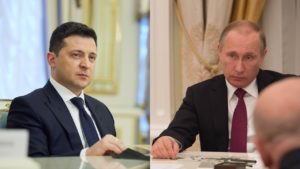
LEFT: The President of Ukraine (Volodymyr Zelenskyy) met with the Chairman of the Council of Ministers of the Republic of Poland. February 1, 2022. Photo courtesy of the office of the President of Ukraine. RIGHT: Russian President Vladimir Putin listens as U.S. Secretary of State John Kerry speaks during their bilateral meeting focused on Syria and Ukraine at the Kremlin in Moscow, Russia, on March 24, 2016. [State Department photo/ Public Domain]
The sound of incoming and outgoing fire was almost constant as the older woman paused for a moment near Kherson’s main hospital, a shopping cart with several water bottles that she had just filled up at the riverbank of the Dnipro resting by her side.
“It was better when the Russians were here,” she said, and either way, “Crimea rightfully belongs to Russia.” She kept on, praising Putin, declining to share her name or to be photographed, and explaining that, at 75, she was still “young at heart” as several Ukrainian soldiers gathered around her. A missile hit nearby, loud and clear, and then another one. Moments later, the woman was off, pulling her two-wheeled cart along—and the soldiers had, in the meantime, already informed the police.
“Anyone can be a Russian collaborator or traitor—age, gender, or background doesn’t matter,” explained Maj. Serhiy Tsehotsky of the 59th Motorized Brigade, adding that it’s the police’s job, not the army’s, to “find out where she lives, who she talks to, and whether she’s involved in illegal activities.”
“The key collaborators have gotten out of Kherson, but many remain,” he said.
Informants, traitors, and collaborators have supported Russia in fighting Ukraine from the start. They have helped geolocate targets throughout the country and even managed to infiltrate the government. Thousands have been detained in the past year; hundreds of court cases have been opened.
“Russian agents are everywhere: in the government, the judicial system, the church. They are members of parliament, judges, priests, and of course civilians,” said Iryna Fedoriv, the editor in chief of Chesno, a Kyiv-based nonprofit that has operated in Ukraine for the past decade and has, since the start of the full-scale invasion, exposed more than 1,000 collaborators—of whom 47 percent are politicians and 27 percent judges.
“Collaborators have infiltrated the entire system—the police, the courts, even the government—and while many people have been detained, many fewer cases have been sent to court,” she explained.
“That’s because the system is rotten and corrupt. We urgently need to reform it. We still have members of parliament from pro-Russian parties. We have pro-Russian judges. Why do we keep them there? We need to get rid of them. Otherwise, we’re destroying our own country.”
While there have been drastic changes since the start of last year’s invasion, Russian influence remains deeply ingrained in many parts of Ukraine, which was part of the Soviet Union for nearly 70 years, from 1922 until 1991. The Kremlin’s ideology still largely regards Ukraine as a historical part of Russia. People throughout eastern Ukraine have traditionally spoken Russian—even though many have now switched to Ukrainian—and Russian propaganda television channels have largely been available, watched predominantly by the older population. Even Ukrainian President Volodymyr Zelensky’s famous television show, Servant of the People, aired with the majority of characters speaking Russian. But historical ties between people in eastern Ukraine, particularly, and Russia have been reappraised since the 2013-14 Maidan Revolution—and especially since the start of Russia’s full-bore invasion last year.
Former Ukrainian President Viktor Yanukovych, who was ousted during the revolution, consistently opted for close ties with Russia during his term and now lives there in exile. In recent years, more than 15 pro-Russian political parties have been prohibited throughout Ukraine.
Even the Ukrainian Security Service (SBU) needs to be “cleansed of moles and traitors,” spokesperson Artem Dekhtiarenko admitted, saying the agency had given special importance to this.
“There are enemy agents in the highest authorities and among high-ranking officials, unfortunately,” he said, pointing to some of the SBU’s recent successes.
If you’re willing to fight for Main Street America, click here to sign up for the Richardcyoung.com free weekly email.




